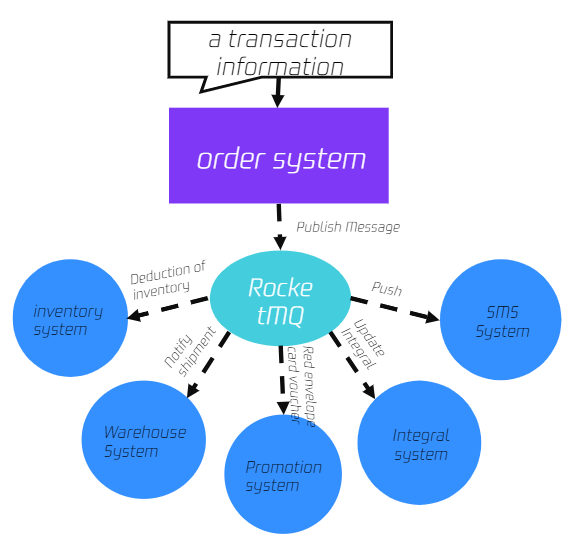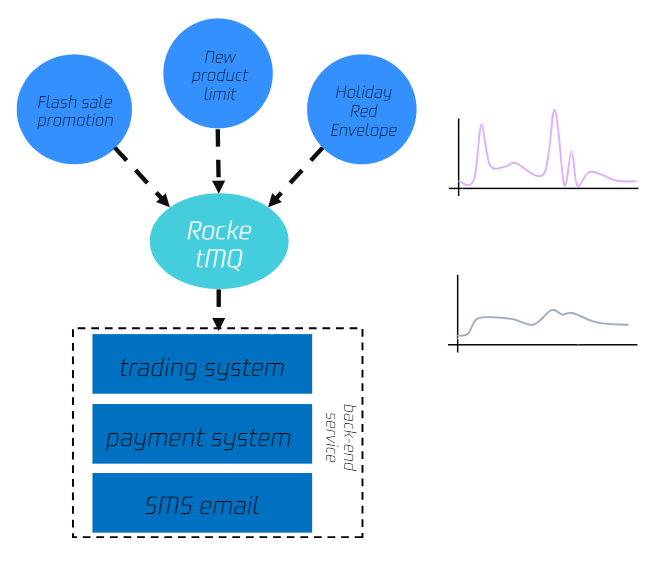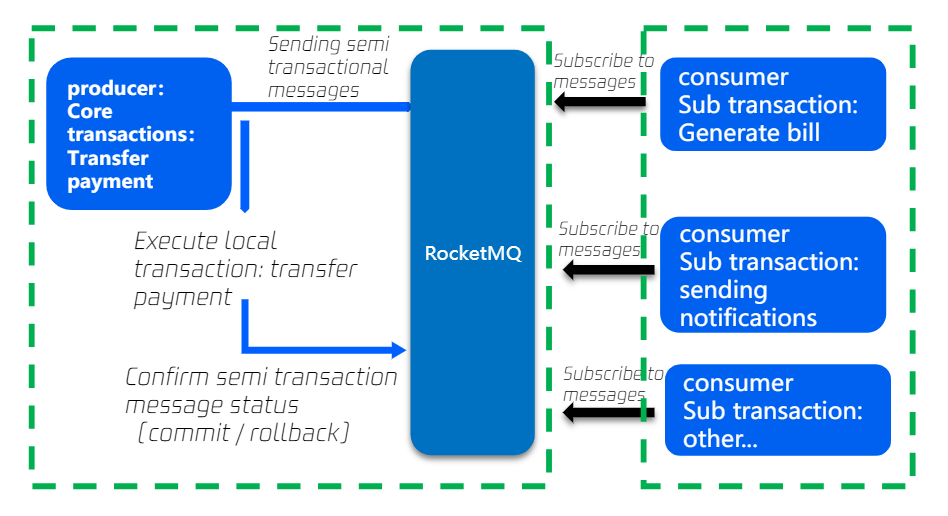Use Cases
Last updated: 2025-07-15 17:42:40
TDMQ for RocketMQ is a distributed message middleware based on Apache RocketMQ. It is applied to message communication between distributed systems or components. It has the characteristics of massive message heap, low latency, high throughput, high reliability, and strong transaction consistency, which meets the requirements of async decoupling, peak shifting, sequential sending and receiving, distributed transaction consistency, and log sync.
Async Decoupling
The transaction engine is the core system of Tencent billing. The data of each transaction order needs to be monitored by dozens of downstream business systems, including inventory system, warehousing system, promotion system, and points system. Such systems use different message processing logic, making it impossible for a single system to adapt to all associated business. In this case, TDMQ for RocketMQ can decouple the coupling between multiple business systems to reduce the impact between systems and improve the response speed and robustness of core business.

Peak Shifting
Companies hold promotional campaigns such as new product launch and festival red packet grabbing from time to time, which often cause temporary traffic spikes and pose huge challenges to each backend application system. In this case, TDMQ for RocketMQ can withstand spikes in traffic. It heaps up messages during peak periods and consumes them in the downstream during off-peak periods, which balances the processing capacities of upstream and downstream systems and improve system availability.

Subscription Notifications
TDMQ for RocketMQ provides scheduled and delayed messages to can meet the ecommerce subscription notification scenarios.
Scheduled message: After a message is sent to the server, the business may want the consumer to receive it at a later time point rather than immediately. This type of message is called "scheduled message".
Delayed message: After a message is sent to the server, the business may want the consumer to receive it after a period of time rather than immediately. This type of message is called "delayed message".

Consistency of Distributed Transactions
TDMQ for RocketMQ provides distributed transactional messages to loosely couple applications. Reliable transmission and multi-replica technology can ensure that messages are not lost, and the At-Least-Once feature ensures eventual data consistency.
As a producer, the payment system forms a transaction with the message queue to ensure the consistency of local transactions and message sending.
Downstream business systems (bills, notifications, others) work as consumers to process in parallel.
Messages support reliable retries to ensure eventual data consistency.
The transaction messages of TDMQ for RocketMQ can be used to process transactions, which can greatly improve processing efficiency and performance. A billing system often has a long transaction linkage with a significant chance of error or timeout. TDMQ's automated repush and abundant message retention features can be used to provide transaction compensation, and the eventual consistency of payment tips notifications and transaction pushes can also be achieved through TDMQ for RocketMQ.

Sequential Message Sending/Receiving
Sequential message is an advanced message type provided by TDMQ for RocketMQ. For a specified topic, messages are published and consumed in strict accordance with the principle of First-In-First-Out (FIFO), that is, messages sent first are consumed first, and messages sent later are consumed later. Sequential messages are often used in the following business scenarios:
Order creation: In some ecommerce systems, an order's creation, payment, refund, and logistics messages must be produced or consumed in strict sequence, otherwise the order status will be messed up during consumption, which will affect the normal operation of the business. Therefore, the messages of this order must be produced and consumed in a certain sequence in the client and message queue. At the same time, the messages are sequentially dependent, and the processing of the next message must be dependent on the processing result of the preceding message.
Log sync: In the scenario of sequential event processing or real-time incremental data sync, sequential messages can also play a greater role. For example, it is necessary to ensure that database operations are in sequence when MySQL binlogs are synced.
Financial scenarios: In some matchmaking transaction scenarios like certain securities transactions, the first bidder is given priority in the case of the same biding price, so it is necessary to produce and consume sequential messages in a FIFO manner.
Distributed Cache Sync
During sales and promotions, there are a wide variety of products with frequent price changes. When users query item prices multiple times, the cache server's network interface may be fully loaded, which makes page opening slower. After the broadcast consumption mode of TDMQ for RocketMQ is adopted, a message will be consumed by all nodes once, which is equivalent to syncing the price information to each server as needed in place of the cache.
Was this page helpful?
You can also Contact Sales or Submit a Ticket for help.
Yes
No
Feedback

